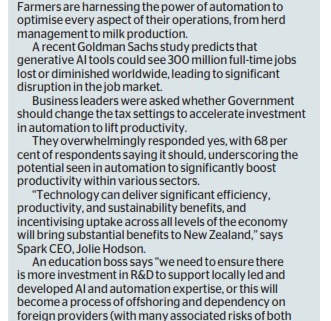Mood of the Boardroom: Automation finds favour (NZ Herald)
Mood of the Boardroom: Automation finds favour (NZ Herald)
Conversations about the future workforce have been running hot lately, particularly following the release of OpenAI’s ChatGPT. Recently, both IBM and British telecommunications giant BT Group cited automation and digitisation when announcing job cuts.
Automation is transforming almost all industries. Farmers are harnessing the power of automation to optimise every aspect of their operations, from herd management to milk production.
A recent Goldman Sachs study predicts that generative AI tools could see 300 million full-time jobs lost or diminished worldwide, leading to significant disruption in the job market.
Business leaders were asked whether Government should change the tax settings to accelerate investment in automation to lift productivity.
They overwhelmingly responded yes, with 68 per cent of respondents saying it should, underscoring the potential seen in automation to significantly boost productivity within various sectors.
“Technology can deliver significant efficiency, productivity, and sustainability benefits, and incentivising uptake across all levels of the economy will bring substantial benefits to New Zealand,” says Spark CEO, Jolie Hodson.
An education boss says “we need to ensure there is more investment in R&D to support locally led and developed AI and automation expertise, or this will become a process of offshoring and dependency on foreign providers (with many associated risks of both cost and missed opportunity).”
Just 15 per cent advocated against alternating tax settings.
Sam Stubbs, founder and CEO of Simplicity, notes that the crux of the matter lies in policy alignment rather than simply adjusting tax settings and deductibility.
Furthermore, a finance executive says the necessary incentives for promoting automation already exist within the current framework.
This perspective is backed up by a professional director, who says that businesses should already be actively pursuing automation, with current economic factors like inflation serving as additional driving forces.



